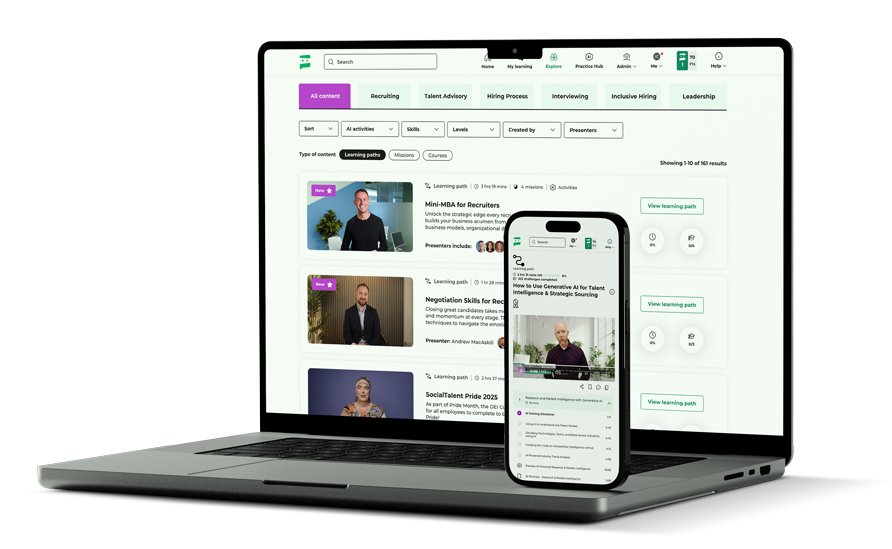
By David Deady
In the fast-paced world of talent acquisition, recruitment training is not a luxury as recruiters are constantly seeking to optimize their processes. Today, it is becoming increasingly crucial for recruiters to embrace technological advancements, particularly Artificial Intelligence (AI), to stay competitive. AI holds the potential to revolutionize the recruiting landscape, offering a variety of solutions that can streamline the hiring process, foster a more diverse workforce, and enhance candidate experience.
This article delves into the role of AI in recruiting, focusing on the application of generative AI, and provides practical insights into crafting effective ChatGPT prompts for recruiters. Let’s get into it!
The Era of AI in Recruiting
As we navigate through the digital era, AI is becoming an integral part of our lives, transforming various industries, including recruitment. This technology offers intelligent, human-like conversational capabilities, such as quickly analyzing sourcing data, creating inclusive job ads, or enhancing candidate outreach. With its ability to comprehend context, generate creative responses, and offer data-driven insights, AI can significantly improve the efficiency and effectiveness of the recruitment process. A prime example of this technology is ChatGPT, a generative AI software that can create human-like text based on specific prompts.
Unleashing the Potential of ChatGPT
ChatGPT prompts are specific instructions or queries designed to generate informative responses or content. These prompts can be in the form of questions, instructions, or even incomplete sentences. The quality and relevance of the response primarily depend on the clarity and specificity of the prompt. For recruiters, ChatGPT prompts can help automate and streamline various aspects of the hiring process, from refining job descriptions to creating engaging candidate outreach content.
Let’s delve into five essential ChatGPT prompts for recruiters, highlighting their importance and providing guidance on how to craft them.
1. Crafting Inclusive Job Descriptions
One of the critical applications of ChatGPT in recruitment is writing inclusive and targeted job descriptions. These descriptions can encourage a diverse range of candidates to apply, thereby fostering workforce diversity.
Prompt Example:
“As an experienced recruiter, your goal is to refine this [software engineer] job description to appeal to a broad and diverse pool of candidates. Emphasize the organization’s commitment to creating an inclusive work environment and welcoming candidates from underrepresented backgrounds. [+ add role details]”
2. Creating Role-Specific Interview Questions
ChatGPT can also assist recruiters in creating a list of interview questions tailored to the specific role being hired for. The more detailed the prompt, the more relevant and comprehensive the generated questions will be.
Prompt Example:
“As an experienced recruiter, your task is to hire a [senior content marketer]. Generate a list of 10 interview questions, ensuring they cover a broad scope and particularly address [social media]. Also include a few behavioral style interview questions.”
3. Preparing for Interviews
ChatGPT can provide recruiters with key talking points for upcoming interviews, highlighting essential areas to assess a candidate’s skills, experience, and cultural fit.
Prompt Example:
“As an experienced recruiter, provide me with a list of key talking points for an upcoming interview with a [marketing manager]. The discussion topics should revolve around the candidate’s experience with [digital marketing, cross-functional collaboration, and creative campaign ideas].”
Learn more: How to leverage AI for recruiting and sourcing.
4. Conducting Boolean Searches
ChatGPT can streamline the process of creating Boolean search strings, enabling recruiters to narrow down their candidate search on job boards and professional networking sites.
Prompt Example:
“As a sourcer, your objective is to find prospective candidates for a software engineering role. Write a Boolean search query for LinkedIn based on the following criteria: Software engineering experience at large organizations, preferably including financial institutions, and experience with Python or related frameworks, Java and related languages. The candidates should be based in New York or surrounding areas. In your search query, extrapolate any synonyms or related terms for core skills or experience using Boolean expressions suitable for LinkedIn.”
5. Following up with Unsuccessful Candidates
Maintaining a positive candidate experience is crucial, even for those not selected. ChatGPT can assist recruiters in crafting thoughtful follow-up emails to unsuccessful candidates.
Prompt Example:
“As an experienced recruiter, compose a thoughtful and personalized rejection email for an unsuccessful candidate. Thank them for their interest in the [Sales Team Lead] role at X company, and encourage them to stay connected for future opportunities. [+ add any additional details]”
Harnessing the Power of AI: Tips and Precautions
While AI, and particularly generative AI, can significantly enhance the recruitment process, it’s essential to use it responsibly and effectively. Here are some tips and precautions for recruiters when using generative AI:
- Clarity and Specificity: The quality of the response generated by ChatGPT depends on the clarity and specificity of the prompt. Therefore, it’s crucial to provide detailed information in your prompts.
- Dialogue: Before initiating the task, you can include the line “before you start, do you have any questions about the task?” at the end of your prompt. This approach allows ChatGPT to ask you a list of questions, enabling you to provide even more specific instructions.
- Proofreading: While AI can generate human-like text, it’s not flawless. Hence, proofreading is essential to ensure the accuracy and relevance of the generated content.
- Personalization: AI-generated content can serve as a solid foundation but it’s important to infuse it with your own language and tone to make it more personalized and engaging.
- Legal Considerations: As the field of AI evolves rapidly, so do the associated guidelines, regulations, and laws. Therefore, it’s crucial to understand the legal implications of using AI in recruitment. Always ensure you seek internal advice from the relevant stakeholders.
Conclusion
In the modern talent acquisition landscape, AI is proving to be a game-changer, offering recruiters innovative solutions to streamline and optimize their processes. By harnessing the power of generative AI and effectively leveraging ChatGPT prompts, recruiters can enhance candidate experience, foster workforce diversity, and ultimately, drive their organization’s growth and success.




